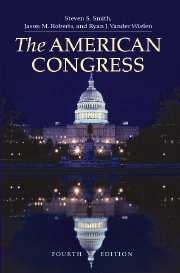Book contents
- Frontmatter
- Contents
- Preface
- 1 The American Congress: Modern Trends
- 2 Representation and Lawmaking in Congress: The Constitutional and Historical Context
- 3 Congressional Elections and Policy Alignments
- 4 The Rules of the Legislative Game
- 5 Members, Goals, Resources, and Strategies
- 6 Parties and Leaders
- 7 The Standing Committees
- 8 The Floor and Voting
- 9 Congress and the President
- 10 Congress and the Courts
- 11 Congress, Lobbyists, and Interest Groups
- 12 Congress and Budget Politics
- Notes
- Suggested Readings
- Index
- Picture Credits
12 - Congress and Budget Politics
- Frontmatter
- Contents
- Preface
- 1 The American Congress: Modern Trends
- 2 Representation and Lawmaking in Congress: The Constitutional and Historical Context
- 3 Congressional Elections and Policy Alignments
- 4 The Rules of the Legislative Game
- 5 Members, Goals, Resources, and Strategies
- 6 Parties and Leaders
- 7 The Standing Committees
- 8 The Floor and Voting
- 9 Congress and the President
- 10 Congress and the Courts
- 11 Congress, Lobbyists, and Interest Groups
- 12 Congress and Budget Politics
- Notes
- Suggested Readings
- Index
- Picture Credits
Summary
The federal budget – more than $2.4 trillion in fiscal year 2005 – is often the center of congressional politics. While many citizens are bored to tears when the details of spending and tax policy are discussed, the budget reflects fundamental choices about the role of government in American life, and action on the annual budget tends to generate the most partisan fights in Washington. The twists and turns of budget politics have strongly influenced winners and losers in elections, reshaped congressional decision-making processes, and altered the distribution of power within Congress.
Federal budgeting since the 1970s has been a roller-coaster ride. Beginning in the late 1970s and continuing for more than a decade, presidents and Congress struggled with annual deficits. In fiscal year 1992, the federal government spent about $290 billion more than it received from taxes and other revenues. To pay the interest on the debt that had accumulated over the years (nearly $4 trillion by that point), the federal government spent a little more than $200 billion – about 14 percent of its $1.5 trillion budget for fiscal year 1992. By 1998, the budget picture had improved markedly. Fiscal year 1998 ended with a small surplus, and annual surpluses were achieved in the three following years. Deficits returned by late 2001 during an economic recession that may have been stretched longer by concerns about the war on terrorism and a war in Iraq. The fight against terrorism prompted increases in defense and homeland security spending.
- Type
- Chapter
- Information
- The American Congress , pp. 367 - 392Publisher: Cambridge University PressPrint publication year: 2005



